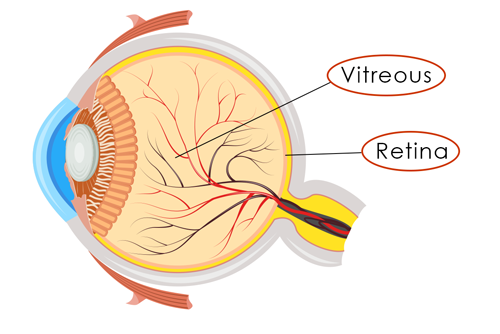
Floaters
The inside of our eyes are filled with a gel-like substance called vitreous. As we get older, the vitreous becomes thicker and begins to shrink and change shape. Clumps may form and create shadows in our field of vision which may appear as specks or dots, squiggly lines, cobwebs, or clouds which move or “float” in and out of view with our eye movement. These spots in our vision are referred to as floaters.
Floaters can be annoying but typically are not reason for alarm. They are often more prominent when looking at something bright such as a blue sky or a plain background such as a blank wall or white piece of paper. Floaters can indicate a more serious problem when they are suddenly more prominent, increase in number, or are paired with loss of peripheral vision or flashes of light. This may be a sign of a retinal detachment which needs immediate attention.
Diagnosis and Treatment
Floaters typically occur as we age but are more common if you are very nearsighted, have diabetes, or have had cataract surgery. Noticing occasional specks or strings in your vision from changes in the vitreous is common. Although frustrating, there is no treatment for floaters except for rare, very serious cases where a vitrectomy may be indicated. Floaters may become less bothersome over time as they fade or eventually “settle” at the bottom of the eye out of your field of vision.1,2
Your ophthalmologist can diagnose floaters through a dilated exam. For this exam, dilating drops are used to enlarge the pupil, allowing your eye doctor to examine the retina and vitreous. Your doctor can assess through this exam if the floaters are indicating a more serious condition such as retinal tear or detachment.
Cause for Concern
Floaters can be an indication of a torn or detached retina when you experience:
- a sudden increase in floaters
- flashes of light (see below)
- a loss of side or peripheral vision
- a curtain is covering part of your vision
These symptoms indicate that the vitreous may be pulling at the retina causing a retinal tear which, if left untreated, can result in a detached retina and permanent vision loss. It is important to seek immediate care from your eye doctor if you experience these symptoms.1,2
Flashes of Light
Sometimes a migraine headache can cause changes in vision. It is possible to have what is called an ocular or ophthalmic migraine which may not be accompanied by head pain. An ocular migraine can cause visual disturbances such as blurriness, flashes or flickers of light, jagged or zigzag lines, or blind spots. Visual symptoms with an ocular migraine typically self-resolve without medication in less than an hour. It may be helpful to rest your eyes.4,5
As mentioned above, changes in the vitreous are a normal part of aging and may cause occasional flashes of light. It is when the vitreous rubs or pulls on the retina that there is cause for concern. In this instance, you may notice flashing lights, streaks of light, or “stars” similar to when you feel lightheaded or hit your head. These flashes of light can last on and off for weeks or even months and could be a sign of a retinal detachment which needs immediate medical attention.1,2
SOURCES / REFERENCES:
1 Kierstan Boyd. “What Are Floaters and Flashes?” American Academy of Ophthalmology, 23 Mar. 2017, www.aao.org/eye-health/diseases/what-are-floaters-flashes.
2 “Facts About Floaters.” National Eye Institute, U.S. Department of Health and Human Services, 1 Oct. 2009, nei.nih.gov/health/floaters/floaters.
3 Marilyn Haddrill; reviewed by Charles Slonim, MD. “What Are Those Floating Spots in My Eyes?” All About Vision, Mar. 2017, www.allaboutvision.com/conditions/spotsfloats.htm.
4 Aaron P Weingeist, MD. “What Are the Bright Wavy Lines in My Vision?” American Academy of Ophthalmology, 26 Dec. 2015, www.aao.org/eye-health/ask-ophthalmologist-q/bright-wavy-lines-vision.
5 Haddrill, Marilyn. “Ocular Migraines Explained – All About Vision [Animation].” All About Vision, Aug. 2016, www.allaboutvision.com/conditions/ocular-migraine.htm.
![]()
